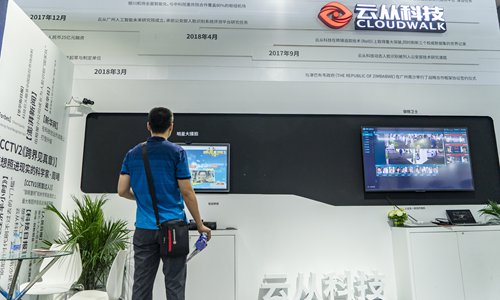Chinese companies, institutions blacklisted by US have Plan B as sanctions take effect
By GT staff reporters Source:Global Times Published: 2020/6/4 20:53:41
Companies, institutions find alternatives to US

A visitor at the booth of CloudWalk at CES ASIA in Shanghai in June 2018 File photo: VCG
Chinese companies and institutions have activated their own versions of plan B in the face of sanctions imposed by the US government that will deprive them of some American supplies, companies and industry insiders told the Global Times on Thursday.Chinese analysts following China-US affairs said the escalation of the US stranglehold on Chinese technology firms, against the backdrop of continued US efforts to stall China's technology advance to maintain its own technology hegemony, will likely accelerate the rollout of Chinese retaliatory measures, including China's own unreliable entity list.
"China is the world's second-largest economy, and the US should never underestimate China's ability to inflict grave damage on the US economy in protection of the core interests of Chinese companies," a Chinese expert, who declined to be identified, told the Global Times on Thursday.
The US Department of Commerce added 33 Chinese technology firms, colleges and research institutes to its Entity List in late May. Huawei was placed on the same list in May 2019. Reuters said the ban is set to take effect on Friday.
Listed entities include leading Chinese technology firms such as cybersecurity specialist Qihoo 360, facial recognition software developer CloudWalk Technology, artificial intelligence (AI) start-up CloudMinds and colleges like the Harbin Institute of Technology.
Pushing a systematic technology decoupling, the US government has ramped up its crackdown on Chinese technology firms since the outbreak of COVID-19 in the country, with provocative rhetoric and actions as US politicians play blame-China card.
Several high-tech Chinese companies said they are actively diversifying their sourcing and will speed up substituting crucial supplies through indigenous innovation amid the US' relentless crackdown on China in a "technology war" that experts have said could last many years.
A CloudWalk spokesperson told the Global Times on Thursday that the company has sufficient supply chain reserves for the next one or two years, and it has established strategic cooperation with Chinese companies at home.
"Being on the list does have an impact on our development, but we are prepared to speed up our localization process," the spokesperson said.
The company called for a concerted effort by the government and all players along the industry chain to nurture a joint force to withstand the challenge posed by the US technology stranglehold.
Ge Qi, vice president of domestic AI firm CloudMinds backed by SoftBank, told the Global Times on Thursday that the US government sanctions will have a structural impact, but the US won't be able to take down China's rising high-tech sector.
CloudMinds has expanded its international presence in recent years and amassed global suppliers, investors and customers. "In this sense, the impact would be structural."
US bullying will only lead high-tech Chinese companies to walk further on the path of self-reliance, Ge said, noting that CloudMinds is evaluating the situation to diversify its sourcing of core components.
The firm has more than 1,500 patent applications for 5G, AI, blockchain and robot intellectual property rights achieved through independent research and development.
An executive with scientific research equipment trading firm Harbin Chuangyue Technology Co, who gave his surname as Ma, blasted the US move as "politically motivated" and said that the US ban will affect the purchase of US-made laboratory equipment.
"The US government has been restricting such purchases for quite some time [under the table], the difference now is that they're making it public," Ma told the Global Times on Thursday. "Of course, this time is a little more serious than before, with the Entity List with our names on it being forwarded to the mailbox of major US companies."
Ma said that long-time American partners are also affected by the US government ban and are trying to figure out what can be done to continue the sales of banned products, which had been selling so well in China.
Ma said his company has a Plan B at the ready. "I just can't talk about it. But it is there. With the US government hitting us this hard, how can we not have a Plan B?"
Huo Jianguo, vice chairman of the China Society for World Trade Organization Studies, said that while the US is the incumbent technology superpower, it does not monopolize all the technologies in the world. "This is bliss for China," Huo said.
"China should stick to an open approach to develop its economy and grow together with its partners, and there are plenty of opportunities to break new ground with new partners where the US cannot wave its 'technology stick'," Huo told the Global Times on Thursday.
Huo noted that fast track practical cooperation with the EU, which also has tons of leading technologies, is a good option.
Newspaper headline: Blacklist spurs Plan B moves